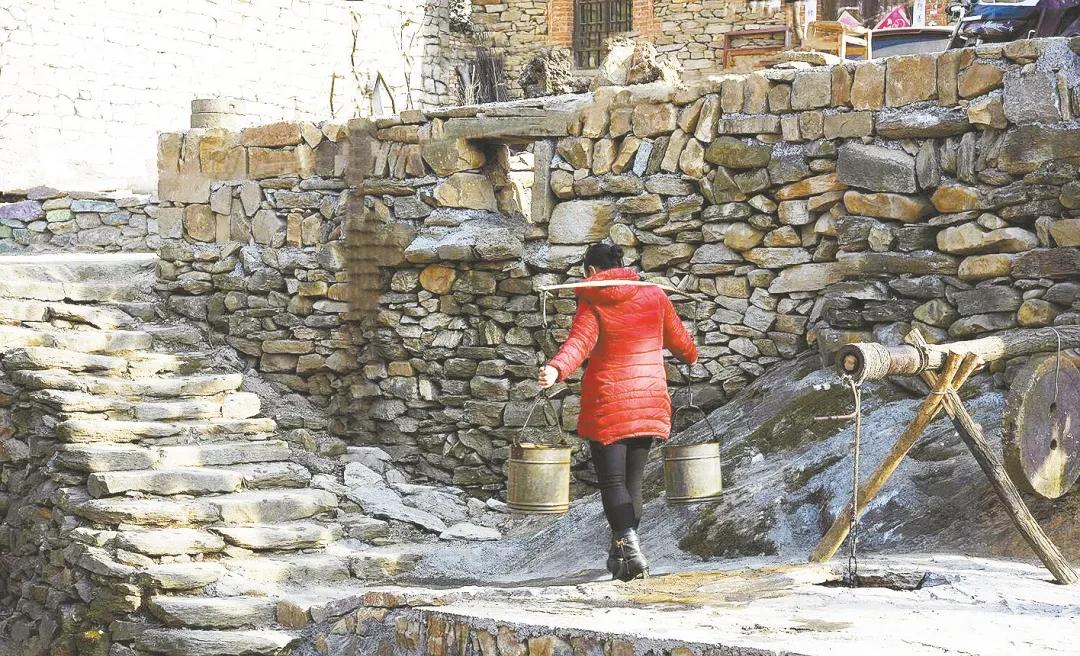Fetch water in the past
What awakens the village from the misty morning light is not the chickens and dogs barking everywhere in the streets and alleys, but the villagers who walk on the water road in the moonlight that has not yet faded. This scene can be said to be a true portrayal of the hometown in the 1980s and 1990s. Although the heavens and the earth are vast, the villages surrounded by drought and loess have to pay more hardships on the way to the water.
All the leisurely dreams of my childhood were shattered by the "creaking, creaking" sound on the road outside the courtyard door. Villagers who are diligent in farming in the fields will consciously get up as soon as they hear the sound of someone walking on the road outside their door. After hurriedly washing, the people picked up the flat shoulders, hung two iron buckets, and quickly walked out of the gate and joined the crowd of people who went to the well to fetch water.

In the village at that time, in the kitchen of every household, there must have been a huge water urn to store water for cooking and washing. The people of the village have always believed that it is more embarrassing than the difficulty of "a smart woman to cook without rice", and not having enough water for the daily life of the family.
The reason why so many people have rushed to the wells in various parts of the village to take advantage of the moonlight that has not yet faded is that the urns in the homes of those people have seen the bottom, or are about to bottom. In order to get the family to wash up and go out, the men in the family had to get up early, thinking that they could pick up a load of water as soon as possible without queuing up.
The wells hidden in various corners of the village, I basically know their exact location. Although I did not have the ability to pick up a load of water at that time, I was full of curiosity about nature, and every time I would follow my father and walk upside down in the direction where the well was located.
What I remember is not only the sound of swaying when fetching water, but also the theme song of the familiar TV series "Fence Woman and Dog" and "Reel Woman and Well". In an era when information was relatively closed and television programs were scarce, these two TV dramas that reflected rural life were a common topic for the villagers after tea and dinner.
The location of the wellhead in the village determines that the water route is not too far, and the distance back and forth is only about one kilometer. Importantly, in order to fill the urn, you have to run back and forth six or seven times, and if you encounter a larger amount of urn storage, it is estimated that it will take ten rounds.
It is precisely in this way that the water is fetched back and forth, which makes the villagers feel in their hearts that the road to fetch water is too long and distant. Or because of this unavoidable reality, when villagers use water, they seem to cherish it, often washing their faces in the morning, the water will not be quickly poured out, but placed on the washbasin shelf, waiting for washing hands can be used again.
At the same time, on rainy days, every household will place all the basins and buckets that can hold rainwater on the dripping places under the eaves. With the help of these rains, my mother and the sisters-in-law of the village did not have to carry the washing basin and washboard, as well as all kinds of clothes to be washed, soap and other items, to the pond to wash. After all, compared to the green and yellowing stagnant water in the pond, the rainwater after sedimentation is much cleaner and clearer.
Later, with the development of society, the wells that were once crowded in the village were first closed because of the access to the water pipes, and then because of safety considerations, they were all filled with loess soil, and there was no way to find them.
When I unscrewed the tap to catch the water, my father once again brought up the past and told me and my children to listen.
(Jing Guoning)